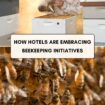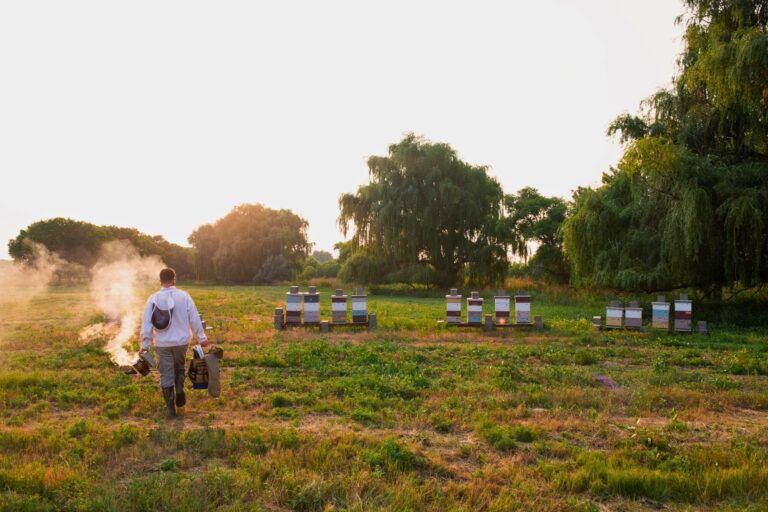
Go World Travel is reader-supported and may earn a commission from purchases made through links in this piece.
Bees, vital to our ecosystem, are more than just pollinators. Their honeycombs yield valuable wax and their honey provides a variety of health benefits.
Recognizing their environmental significance, hotels are increasingly partnering with beekeepers to support sustainable apiculture. This enterprise not only benefits bees but also contributes to a healthier planet.
The Anatomy of a Beehive
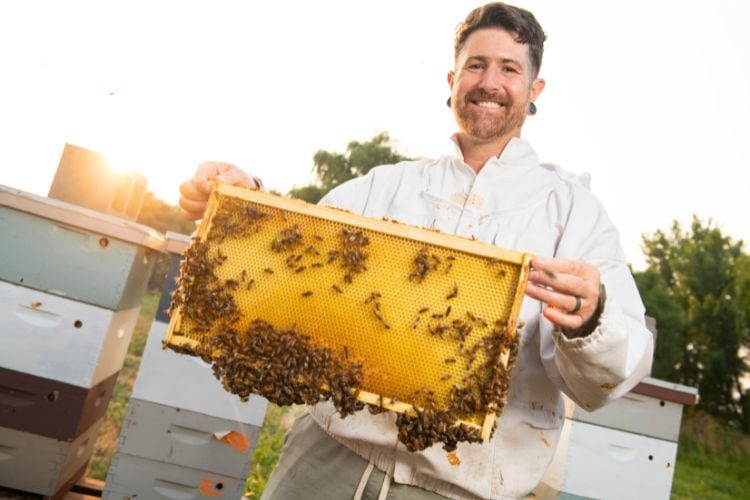
Bees naturally create their hives where their queen is, protecting her, creating the honeycomb, and producing honey at the location. Beekeepers have harnessed that natural instinct to create artificial hives with removable frames to harvest from the hive without destroying it.
Best Tips & Tools to Plan Your Trip
There is a definite art to beekeeping, from techniques like singing to the bees and using a particular smoke to calm them to organic acids to keep mites and disease from the hives; a combination of art and science converges in modern-day beekeeping.
Hotel Clio Beekeeping
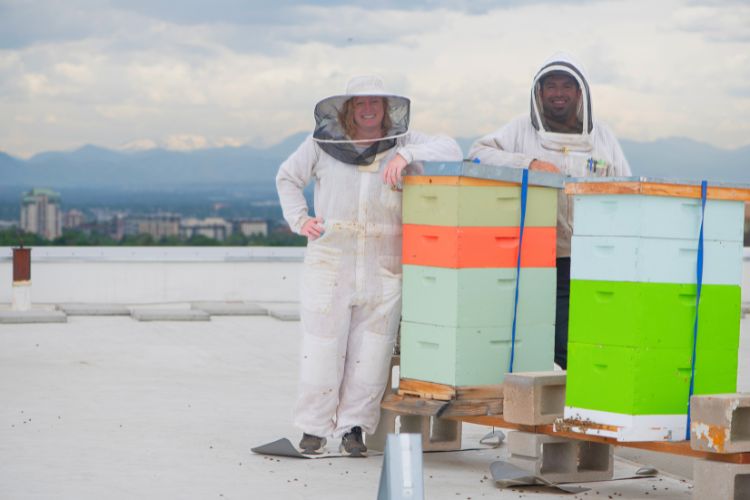
Sarah and Matt McLean have been beekeeping since 2019, when Matt gifted Sarah, who has a Conifer upbringing and curiosity in honeybees, their first beehive. The couple now tends over 75 hives. What started as a hobby and interest in bees has grown into a profession and Matt is a Master candidate in the Colorado State Beekeepers Association Master Beekeeper Certification Program.
Their golden honey comes in recyclable glass jars (to prevent even more plastics from entering the world and landfills) and they attend artisan markets with their Homestead in the Hood Honey.
Partnering with Hotel Clio in Cherry Creek, they took over the rooftop hive from another beekeeper and now oversee two healthy and active hives. Honey and beeswax products can be found in hotel products and in the restaurant.
The Hotel Clio hive is home to the Slavic breed of bee: the Carniolan. The darker bees with brown spots or bands on the abdomen do well with Colorado’s climate and can survive the winters. Foraging nectar from nearby trees and flowers, the bees create 150-200 lbs of honey in the summer. The beekeepers leave the bees around 100 pounds of honey and the surplus is used by the hotel. The McLeans promote taking care of your piece of the planet with using as few chemicals as possible. They also handle the bees bare-handed and view themselves as hive hosts and bee ambassadors.
Broadmoor’s Eagles Nest Ranch Hives
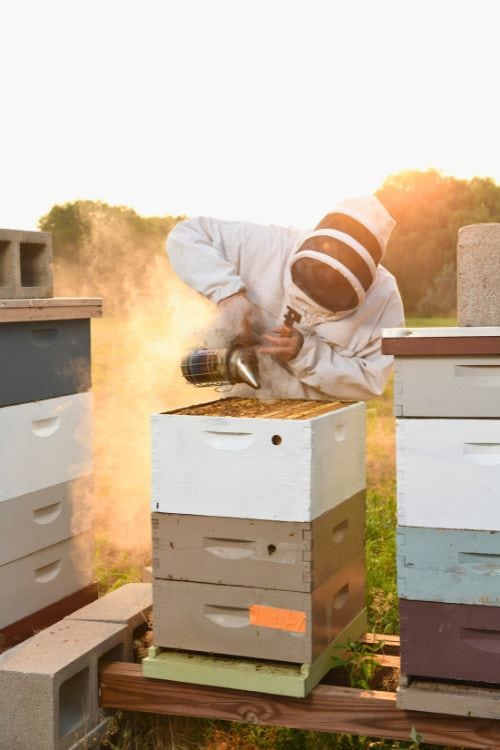
Further north, Eagles Nest Ranch is where the historic Broadmoor Resort’s bee colony can be found. Under the watchful eye of KJ Ruiz Tencza with his son Zion and daughter Yara, you might say there’s a little love from God in these hives, as KJ is a pastor during the day when he’s not tending to the bees. Singing softly as he lights up the bee smoker to calm the bees, there is definitive care and grace that reflects the approach of “Finding the Sacred in the Simple.”
KJ explains that the honey reflects the flavors of the local flora, and his placement of the hives near a thicket of weeping willows, rolling hills and flowering meadows enhances the flavors of the honey used at The Broadmoor. He checks on the hives at dawn and dusk every day, while recognizing the work of the bees as well—the bees labor together while each bee rarely benefits directly from its own work.
Pointing out the larvae that are about to emerge and start their own lifecycle, the golden hues of the honeycomb, buzzing of bees’ wings and honey sparkle in the setting sunlight. Beekeeping since 2013, KJ loves the ritual and Colorado’s natural wonder.
A Planet in Balance
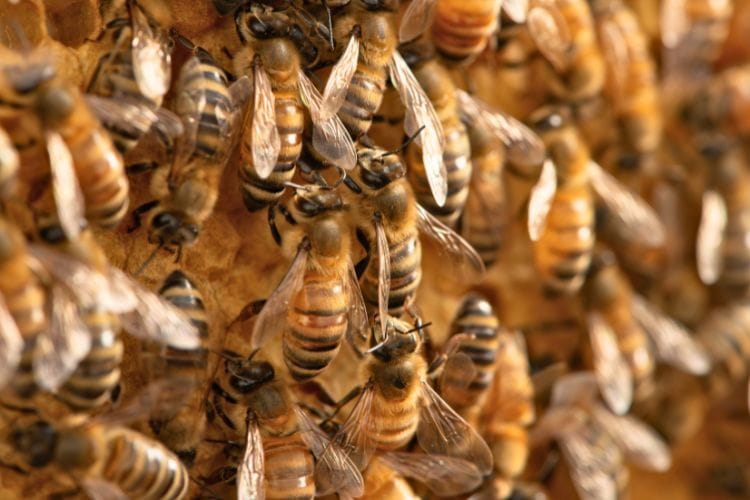
Utilizing local honey and beeswax products has a large and positive impact on local ecosystems and the economy. Raw honey provides a variety of health benefits, and the carbon footprint of not transporting commercial honey from other states or countries also benefits the environment.
Flying honeybees pollinating trees and flowers ultimately generate over 75% of the world’s food crops, according to the United Nations, and Colorado agricultural and urban areas see that benefit as well.
With hotels and hospitality lending their support for beehive locations on rooftops, product procurement and sustainability, bees are here to stay and thrive hand in hand with Colorado hospitality.
Read More:
Author Bio: Chad Chisholm is a freelance writer and photographer. See more on Instagram at @chadchisholmphoto
- Discover Claremont, California Along Historic Route 66 - December 6, 2024
- Three Sites to Soothe the Soul in Kyoto, Japan - December 5, 2024
- 13 Essential Tips For Women Traveling in Morocco - December 4, 2024

